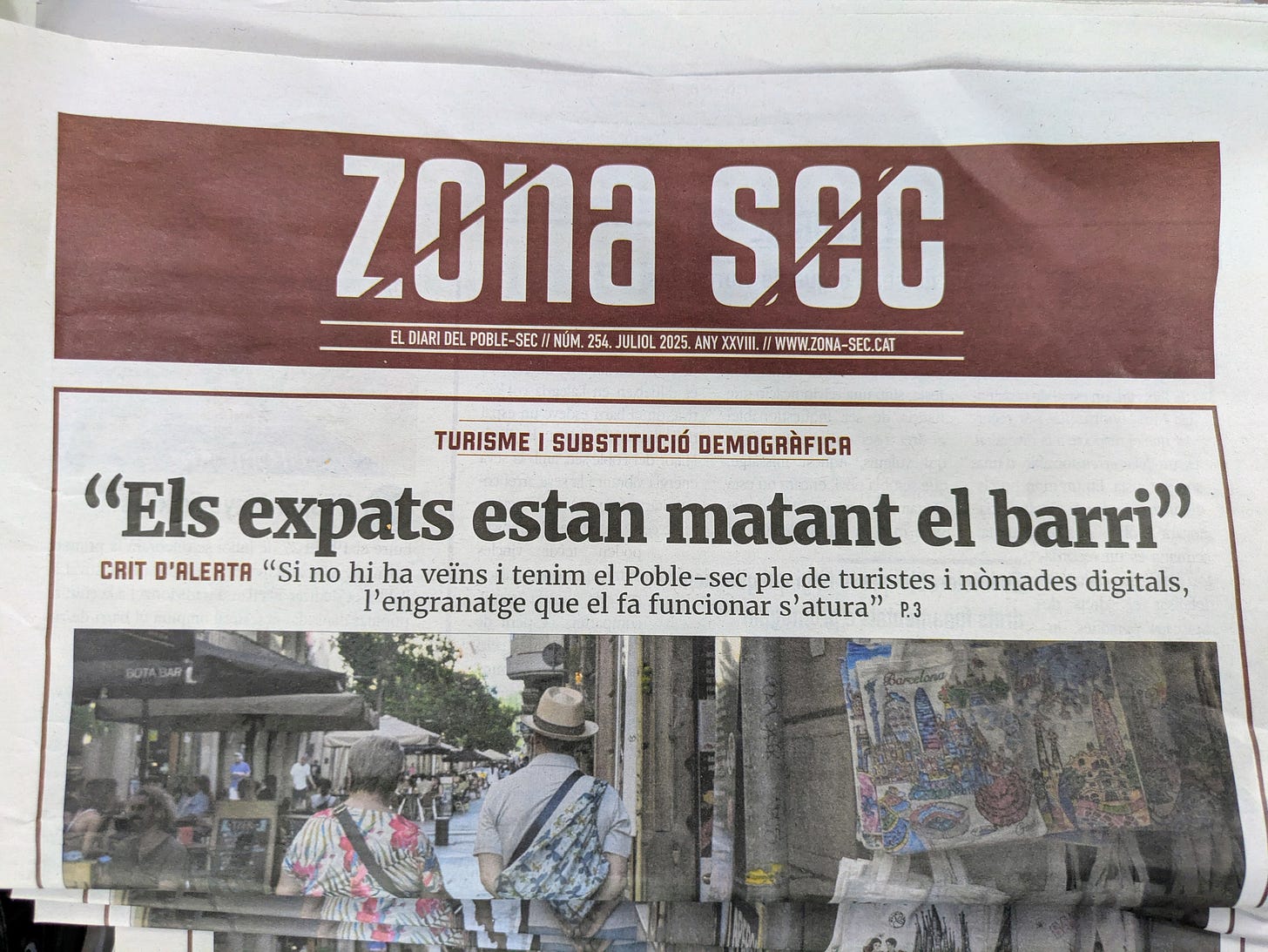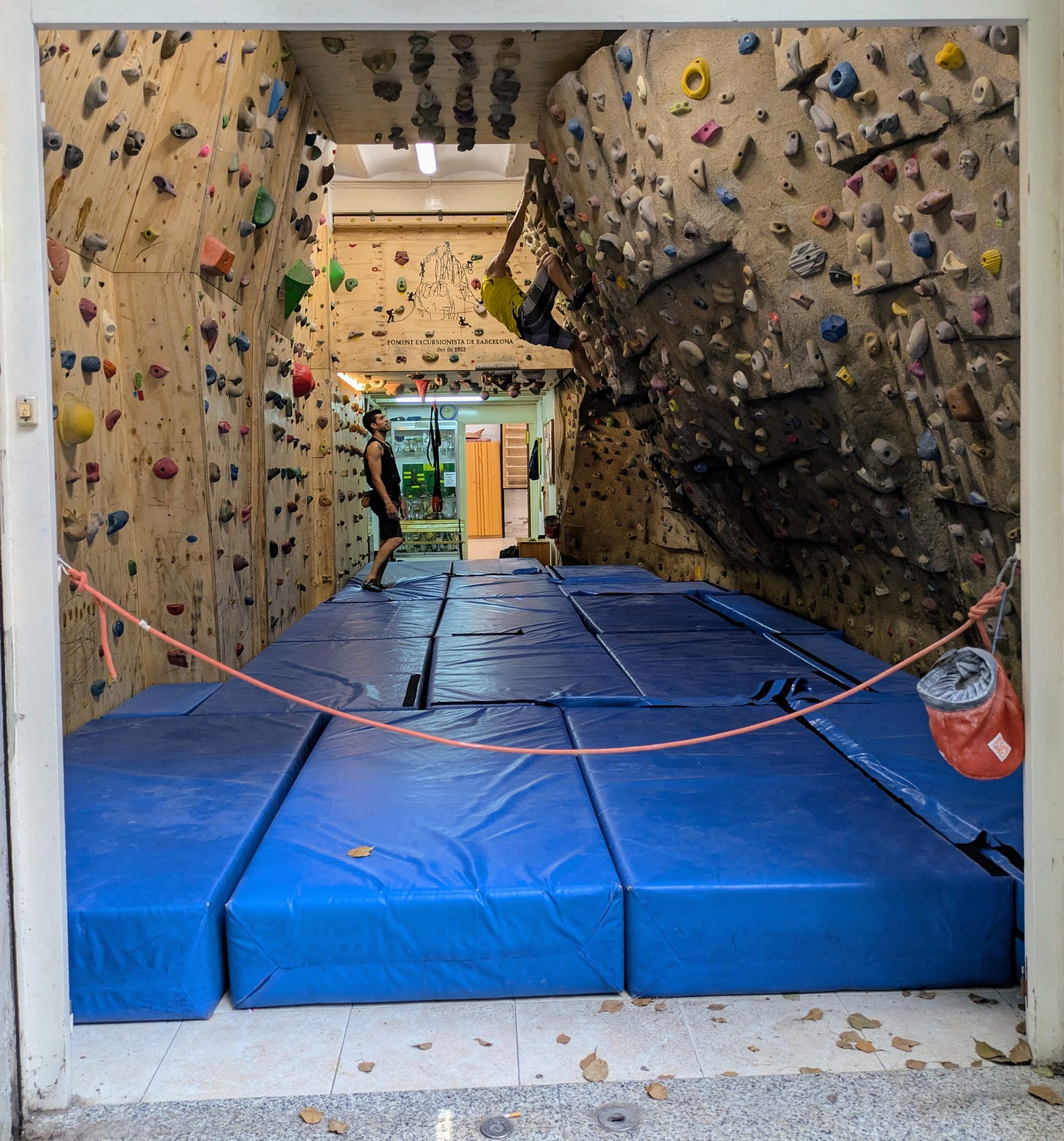The newspapers were sitting on stacks of paint cans, and though the main headline was in Catalan, it was easy to read:
The expats are killing the neighborhood.
I looked up and asked the owner of the paint shop in Spanish if he thought it was true. He was Catalan, in his 40s, and for all I know, he’d been running the paint store his whole life, as had his parents before him.
He replied something perfunctory about rising house prices and continued to ring up my order. A pale blue for the guest room. Algodón white for the television space. It was at least my fourth trip to his shop since buying an apartment in June. I figured it was enough for a casual question about the most contentious issue in the city. At least it was clear I wasn’t some digital nomad renting a nearby Airbnb.
Later, I spread the front page out on my kitchen island and worked through it slowly, Google Translate in hand. Many Catalan words are similar to Spanish, so it was easier than expected. My favorite bit was about the large group of Asians blocking all traffic on a street corner nearby—I mean, who among us hasn’t had to navigate through a large group of Asian tourists?
Overall, though, it was a familiar story, one written in cities around the world for at least the last two decades. It had been written in D.C., where I lived for ten years. And in Santa Fe, where I was born, and in small, medium, and large cities across the developed world. It’s the story of gentrification.
And I was certainly a part of it.
I’ve been living in Spain now almost two years. Born in the U.S., but with dual EU citizenship, I was able to get a residency permit for Spain relatively easily. I’ve now purchased two properties here, one a renovation project in the mountains near an international climbing mecca, the other in the Poble Sec neighborhood of Barcelona.
So what does that make me? An immigrant? An expat? An EU citizen living in Catalunya? An Estadounidense living the good life? The only term I reject out of hand is digital nomad—I may earn money with my computer, but I am not nomadic.
Still, my income doing marketing for U.S. clients dwarfs the median income of most Spanish residents, including those in Barcelona. I have more savings, more cash on hand, and more coming in, and therefore, I can afford to pay more for housing than most locals. And, according to my high school economics 101, that means those who own property can charge more if they want to sell.
The more of me there are in Barcelona, the higher prices will go.
It’s inevitable that I would ruminate on this, and here is one key result of said rumination: buying the apartment in Poble Sec is quite different than buying the abandoned four-story townhouse in Cornudella de Montsant.
As far as I can tell from talking to my neighbors in the countryside, that property has been abandoned for more than 30 years. Without me and cash on hand, it would in all likelihood stay abandoned. The leaks would get bigger. The concrete would continue to crumble. The dust and dirt would accumulate. With me, there will one day be two apartments there. It will make me happy to add to the housing stock of a country that insists it is in the middle of a housing crisis.
But then, as savvy observers will note, Spain isn’t so much lacking in homes as it is facing a mismatch between where the homes are and where people actually want to live.
My renovation project happens to be in a growing rural area, as opposed to a shrinking one. There is a rising international climbing community, in addition to growing wine tourism. There are three wine co-ops in the town, all of them busy (Montsant is one of Spain’s great wine-growing regions).
The Poble Sec apartment in the heart of one of Barcelona’s proudest old neighborhoods is another story. It doesn’t need renovation. It was occupied when I bought it. The sellers were an older Catalan family who decided to relocate to the countryside. That’s all I know.
But I do wonder: did they think of themselves as participating in gentrification? Did it matter to them that the buyer was from the U.S., with a German passport? Are they, in some respect, just as much a participant in rising home prices as I am?
Few would begrudge them, or any family in any city in the world, deciding to sell their home. Yet many would begrudge me for buying it.
Such is the logic of those who watch their neighborhood changing before their eyes. It makes all the sense in the world. There are only so many homes, and more and more people. They understand high school economics just the same as me. No wonder high home prices leads to declining support for immigration.
I’ve stated my preferred solution for this ad nauseam: build more homes. Many, many more homes.
But as long as I’ve been aware of the housing crisis (my first career, at age 23, was as a political reporter covering housing and development), I’ve also been watching neighborhoods and governments take self-defeating positions on it.
As Ian Mount wrote in his excellent newsletter, The Bubble, the government is doing (almost) everything to make it worse:
Enter the Ley de Vivienda, the government’s ambitious plan to cap rents, tax vacant homes, and declare “tense” zones too profitable for landlords. This has been most eagerly embraced by Catalonia and its capital Barcelona, which had added another requirement to the mix: that developers set aside 30% of new and refurb projects for affordable housing.
The result? Many property owners have pulled their flats from the rental market altogether or moved them onto the black market, creating an even tighter squeeze on available supply… And since 2023, Madrid has attracted four times as much rental real estate investment as Barcelona, according to the latest JLL report on the impact of regulation in the sector.
Antonio de la Fuente, director at Colliers, put it simply:
“Investors no longer invest in areas where the Housing Law applies.…Institutional investors no longer want to even hear about operations in Catalonia or in ‘tense’ areas."
I suppose it’s fine to have fewer investors if it means more buyers. But I’ve got news for renters: almost every single one of you is living in someone else’s investment property. And the policies of the city and national governments are decreasing the available rental stock—the opposite of what’s intended.
Still, no matter how many people point out the unintended consequences of well-intentioned housing policy, I still walk around Barcelona hearing from everyone how they support rent freezes.
It does baffle me, but it feels like pretty much an ironclad law of politics that A., it's easier to add regulation than subtract it, and B., people will more or less always support what feels like the easy fix (such as ban Airbnb) rather than do the more nuanced work of actually making housing easier to build.
Of course, that’s all cold comfort to residents who feel they are being driven out by high prices. A family about to be evicted from their home will always garner more sympathy than an investor unable to earn a return. The mental trick is to recognize that investors able to earn a return means more housing stock, not less.
Alas. I’ve purchased my apartment and the deed is done. I’ve used my second passport, taken advantage of my remote work, and made decisions for my own quality of life and that of my family. Begrudge me or not. It is now on me to not be the ugly expat from the newspaper.
After painting the last bedroom in my apartment, I finally got a chance to walk over to the next block, where there is a climbing association that has been there for decades. It’s more than a small bouldering gym—it’s a community of climbers and alpinists. They plan trips, rent gear, and pool money for improvements. They only do annual memberships—no day rates, punch cards, or monthly passes— and the membership comes with insurance in case of emergency in the mountains.
When my girlfriend and I got there, a group of climbers were in the middle of a planning meeting. A friendly Catalan woman in her 60s recognized my girlfriend (she lived in the neighborhood previously) and excused herself to welcome us.
We took off our shoes and walked around the boulder hut. Hung for a few minutes on the wooden fingerboard. Said hello to some older gentlemen socializing in the back meeting room. On the wall, posters of group expeditions. Notices of upcoming trips. The holds in the training area worn smooth from use. The mats underneath shoved together, still possible to put an ankle through the cracks.
It was about as far from a commercial climbing gym as possible—and the perfect way to join the community. It was a community. Expat or not, we were all climbers there.
Thankfully, there are many ways to join a neighborhood.




I love the story at the end about the climbing gym. You must have known it was there before you bought right?
I witnessed a similar tension living in the southern pacific zone of Costa Rica. This was a region that didn’t have a two lane paved road to it from a major city until 2010.
With the road came more tourists. But also more expats from the US, Canada and Europe (including our family).
With the expats came a lot of new construction- big homes on the mountains, more cars on the dirt roads. They built new private schools, more roads were paved, food prices rose and rent climbed 150% in our time there.
The new construction brought work for some builders, hardware stores, lawyers and real estate agents (most of whom were expats themselves). This kind of economic benefit is not as broadly shared in an economy geared towards tourism. And taxes paid by expats are relatively low despite what some will say.
During and post Covid brought a new wave (particularly Canadian libertarians with money) into a collectively minded society of Costa Ricans. More houses. More $30k side-by-side ATVs with racing stripes.
Despite their financial investments, these expats did not always last. The remoteness, the lack of “creature comforts” made it a one to two year experience for many.
Someone once told me “The jungle always wins”. It always grows back, it can’t be conquered, it’s too vast and persistent. But it seems the outside world is putting up a good effort to change it.
I love that corner of the world, made deep connections and found a community despite all the changes. Our children were raised there and are fluent in Spanish. I’ll always go back to it.
I do hope the jungle keeps winning.
The answer to the world's housing problem lies in Singapore. There housing is divided into two legal titles: HDB and private. HDB housing is for nationals only and works almost as a communist style system prohibiting sublets and allowing only owners to live in their properties. There are strict anti speculation measures e.g you cannot resell before 5 years. The other 50% of the housing market is private with very few restrictions and where buying and selling is easy. This system works better than any other system I have seen.